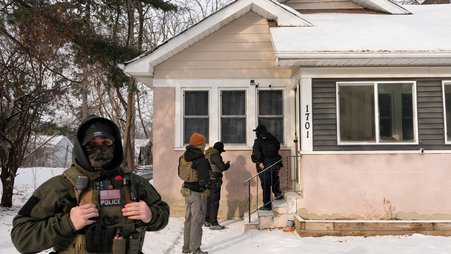It seems every week a new member of Congress goes on a Sunday talk show and incorrectly states that if Edward Snowden came back to the United States to stand trial, he would be able to tell his side of the story to a jury and argue he is a whistleblower. This is factually not true, and it's time for the media to start pushing back at those who suggest it is.
This week it was Senator Chuck Schumer (D-NY) on ABC's "This Week." Here's what Schumer said, according to the New York Times:
Mr. Schumer said...[Snowden] should return to stand trial and face the consequences of his actions. Such a trial, the senator said, could be enlightening for the country.
...
He said it was unclear how much the broad metadata gleaned by the National Security Agency had helped the fight against terrorists; how much damage Mr. Snowden had, in fact, done to intelligence efforts; and precisely how the data were used.
“All of this could come out in a trial; it would be beneficial for the country to have the discussion,” Mr. Schumer said. “So, running away, being helped by Russia and China, is not in the tradition of a true civil disobedience practitioner.”
In reality, none of that information would be heard by a jury, if prior Espionage Act cases against leakers are any guide. Judges have ruled evidence showing intent to inform the public, benefits of the leaks, and lack of damage to national security is inadmissible. We made this point just two weeks ago, but it seems worth repeating since it seems as though members of Congress opining on Snowden's legal options do not know how the law works. Here are how four of the most recent Espionage Act leak cases have turned out:
- John Kiriakou, the former CIA officer who was the first to go on-the-record with the media about waterboarding, pled guilty in his Espionage Act case last year partially because a judge ruled he couldn’t tell the jury about his lack of intent to harm the United States.
- In the ongoing leak trial of former State Department official Stephen Kim, the judge recently ruled that the prosecution “need not show that the information he allegedly leaked could damage U.S. national security or benefit a foreign power, even potentially.” (emphasis added)
- In the Espionage Act case against NSA whistleblower Thomas Drake (which later fell apart), the government filed two separate motions to make sure the words "whistleblowing" or "overclassification" would never be uttered at trial.
- In Chelsea Manning's trial this summer, Manning's defense wanted to argue she intended to inform the public, that the military was afflicted with a deep and unnecessary addiction to overclassification, and that the government’s own internal assessments showed she caused no real damage to U.S. interests. All this information was ruled inadmissible until sentencing. Manning was sentenced to thirty-five years in jail—longer than most actual spies under the Espionage Act.
At this point, it's time for the media to start pushing back on government officials suggesting Snowden should tell his story to a jury, when caselaw says he would be barred from doing so. The New York Times is aware of this fact, as they mentioned it in another article published Sunday about the chances of Snowden receiving clemency. But in their story about Schumer's comments, they let his false statement go uncorrected.
It's also time for Congress to start debating the merits of using the Espionage Act on the sources of journalists. If Sen. Schumer thinks that Snowden should be able to tell all of the above information to a jury, we look forward to his amicus brief in a potential Snowden trial arguing that a whistleblower defense should be admissible. In the mean time, he and other members of Congress concerned about whistleblowers getting a fair trial should push for reform or repeal of the Espionage Act.




